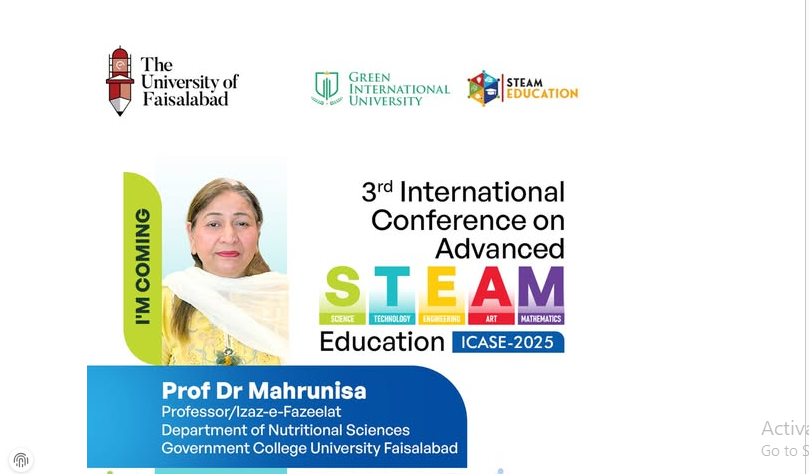Transforming Pakistani Food Systems to Make Them Healthy and Climate Resilient
As global food challenges intensify due to climate change, rising malnutrition, and unsustainable agricultural practices, transforming national food systems has become an urgent priority. Pakistan—home to one of the world’s largest agricultural economies—stands at a critical point where scientific innovation, nutritional research, and climate-aware strategies must converge to build a healthier and more resilient future.
This theme shaped an insightful session at the STEAM Conference 2025, held at Saleem Auditorium under the Nutrition and Dietetics track. The session was chaired by Prof. Dr. Mahr un Nisa (GC University, Faisalabad), who emphasised that Pakistan’s food system must move beyond traditional production models toward a framework that integrates sustainability, technology, and public health. Supporting her as Co-Chair, Dr Amber Tehseen from The University of Faisalabad highlighted the need for multidisciplinary collaboration between nutritionists, climate scientists, technologists, and policymakers. Together, they laid a strong foundation for an engaging and solution-driven discussion.
Keynote Insight: AI-Driven Personalised Nutrition – Allah Rakha (UAF)
The session opened with a powerful invited talk by Allah Rakha from the University of Agriculture, Faisalabad, who presented “Toward Precise, Predictive and Personalised Nutrition: AI-Driven Diets for Health Optimisation.” He explained how artificial intelligence is revolutionising dietary science by analysing metabolic responses, lifestyle data, and genetic indicators to design personalised meal plans.
He stressed that in countries like Pakistan—where diet-related diseases are rising—AI-powered nutrition has the potential to reduce healthcare costs, prevent chronic illnesses, and create individualised interventions. His talk reinforced the core theme of building adaptive and intelligent food systems aligned with future public health goals.
Invited Talks Strengthening the Climate-Resilient Food Vision
Maternal and Child Nutrition: Challenges and Opportunities
Mehwish, Institute of Food Science and Nutrition, University of Sargodha
Mehwish highlighted the nutritional crises faced by mothers and children in rural and underserved communities. She discussed the urgent need for fortified foods, sustainable dietary programs, and community-level interventions—especially as climate change disrupts crop patterns and affects food availability.
A STEAM Perspective on Dietary Patterns and Mental Wellness
Javeria Shabbir, The University of Faisalabad
Javeria explored the connection between nutrition and mental health, focusing on how dietary choices influence cognitive functioning, emotional balance, and psychological resilience. She emphasised that a healthier food system must account not only for physical health but also for mental well-being, especially among youth and working populations.
Digital Innovations to Tackle Malnutrition and Food Insecurity
Maham Saeed, The University of Faisalabad
Maham presented innovative digital tools, including mobile monitoring apps, educational platforms, and AI-driven decision systems that help track dietary deficiencies and predict malnutrition hotspots. Her talk showed how technology-enabled STEAM education can empower communities with awareness and actionable knowledge.
Artificial Intelligence in Nutrition and Public Health
Laiba Shahid, The University of Faisalabad
Laiba discussed how AI is transforming nutrition research through smart food analysis tools, dietary recommendation engines, and automated nutrient profiling. She noted that these technologies allow policymakers to design data-driven food programs that are both sustainable and consumer-friendly.
Toward Healthier and Resilient Food Strategies
Hafiza Nimra Mukhtar, The University of Faisalabad
Hafiza Nimra ( The University of Faisalabad )underscored the importance of climate-resilient crops, sustainable farming practices, and public awareness campaigns. She explained how integrating scientific research with community nutrition initiatives can protect Pakistan from future climate-induced food crises.
Why Transforming Pakistan’s Food System Matters
The presentations collectively highlighted that Pakistan’s food security challenges cannot be addressed through agriculture alone. A holistic transformation is required, powered by:
- Climate-smart farming and sustainable crop management
- AI-driven nutritional planning and health monitoring
- Fortified and diversified diets for vulnerable populations
- Digital diagnostic tools for malnutrition detection
- Policies promoting food safety, resilience, and affordability
This integrated approach ensures that Pakistan’s food system remains robust despite climate fluctuations, economic pressures, and population growth.
Conclusion
The session made one message clear: transforming Pakistan’s food system is not just a health mandate—it is a national responsibility. With the leadership of Prof. Dr Mahr un Nisa and Dr Amber Tehseen, and enriched by thought-provoking contributions from Allah Rakha, Mehwish, Javeria Shabbir, Maham Saeed, Laiba Shahid, and Hafiza Nimra Mukhtar, the discussion encouraged a collective shift toward nutrition science, technology, and climate-aware strategies.
As Pakistan moves toward resilient, healthier, and more sustainable food solutions, the insights from this session offer a roadmap for shaping a food-secure and climate-ready future.

